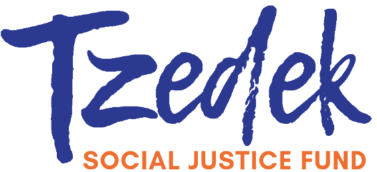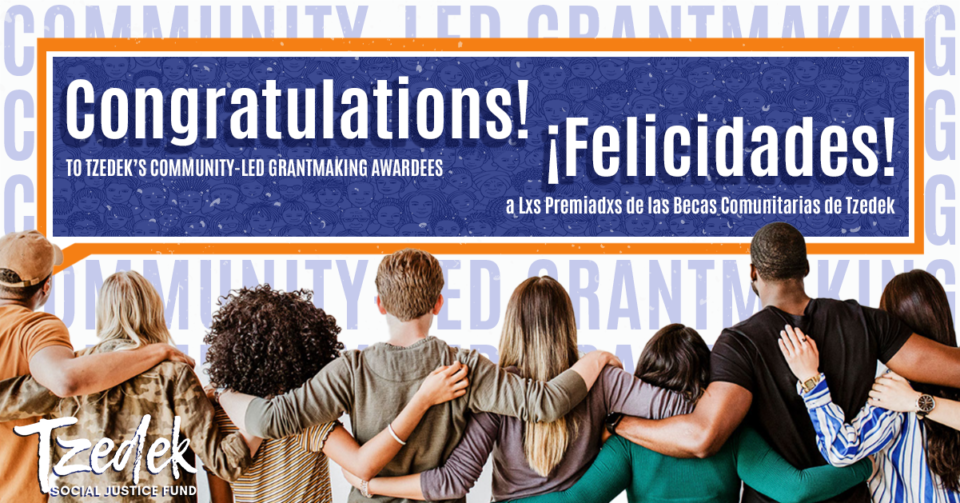Available in Español
We’re thrilled to announce the grants made through Tzedek’s new initiative–Community-Led Grantmaking. In 2021, a cohort of five Fellows with the support of Tzedek staff moved $250,000 into the hands of Asheville organizations making change and working towards collective liberation, racial justice, LGBTQ justice, and combating antisemitism.
This program represents a shift away from traditional philanthropy in several ways. First, community-led grantmaking is a model that shifts decision-making power about grants from our Funder and Founder, Amy Mandel, to local community leaders. Second, grants are distributed, tracked, and processed using practices of social justice philanthropy. Rather than burdening grantees with cumbersome reporting requirements, the incredible organizations doing the work of collective liberation will be supported to focus on doing as much good as possible.
About the Grants
Regal Afterschool at Pisgah View Center (fiscally sponsored by the University of North Carolina at Asheville Foundation), a collaboration by Cicely Rogers, Toshia Sitton, Terri Hughs, Dr. Tiece Ruffin, and Dr. Sam Kaplan ($93,000), uproots and dismantles racial inequities for students living in Pisgah View. This project builds upon a successful community-driven pod that emerged to help families navigate COVID. In the coming year, Regal Afterschool will focus on social-emotional wellbeing, civic action, alongside affirming and relevant curriculum.
Soul to Soil Project ($30,600) promotes resilience literacy through food sovereignty initiatives and creativity. Through their Coming Back Home to Earth project, Soul to Soil will over integrative, experiential learning, prioritizing Queer (LGBTQIA2S+), Black,Indigenous, People of Color (BIPOC), and historically or economically-marginalized participants.
JMPRO TV ($30,000) is a grassroots media organization that builds connections, shapes narratives, and celebrates culture through in-depth stories about Asheville’s Latinx, Black, native, and LGBTQ communities. Fiscally sponsored by the WNC Workers Center, this grant will fund media-focused capacity building and storytelling training for communities of color with the goal of producing content in native languages.
Solid Ground ($21,000), fiscally sponsored by KL Training Solutions, is an initiative led by Alice Dixson, is a peer support project that serves biological parents and families from marginalized and vulnerable communities impacted by poverty and systemic barriers to wellness who are involved with child protective services. These funds will resource support groups for parents making steps toward family reunification and healing.
Still Smiling Photography ($15,000) will be working with five young people interested in photography to build skills that support creative expression and a pathway to entrepreneurship in a project fiscally sponsored by the SPARC Foundation. These youth will photograph community events and collaborate with communities of color.
Resources for Resilience (RFR) ($14,000) respond to the public health crisis caused by adverse childhood experiences (ACEs), toxic stress, and traumas of oppression, by providing training that acknowledges these harms, fosters conversation and connection, and promotes resilience. This grant will support a partnership between RFR and Helpmate to pilot the Care for the Caregiver program with individuals living in their shelter who are disproportionately BIPOC.
Noir Collective ($12,400), fiscally sponsored by Asheville Creative Arts, supports Black Liberation through Arts, Culture, and Kinship (BLACK) by featuring the wares of local and regional artists, designers, and craftspeople. Their mission is simple, Bringing Black back to the Block, Asheville’s historic Black Business district. This funding will be used to boost Noir Collective’s online presence, while supporting a longer term goal to develop a new model for cooperative community marketing.
Institute for Preventative Healthcare and Advocacy (IFPHA) ($12,000), founded and led by native Ashevillian Kathey Avery, will be funding an ongoing initiative focused on the health of residents of public housing developments and senior living facilities. Community health workers provide direct services and health education to help residents avoid unnecessary and preventable eviction, hospitalization, and other costly levels of care. IFPHA will also train embedded community health workers who are actually part of the communities.
Just Economics ($12,000) is working for affordable housing in WNC and organizing renters through grassroots strategy. These funds will support the creation of a tenets’ network, a centralized rental application, and advocacy led by people most impacted by Asheville’s housing crisis.
Errand Boys ($10,000) is an Asheville-based, Black owned and operated car repair shop and dealership that provides buyer education about predatory lending practices that disproportionately harm Black and Brown families. This grant will fund community education and an apprenticeship project fiscally sponsored by UMOJA Health, Wellness, and Justice Collective. The community education project is designed to support young entrepreneurs to create automobile-focused businesses like detailing, repair, and sales.
About the Grantmaking Process
Over five months, Tzedek’s Community Grantmaking Fellows built relationships with each other, while designing and facilitating a brand new grantmaking process. Fellows grounded their design work in deep conversation with local folks about how to design an offering with a straightforward application process and little reporting burden for awardees, while meeting the legal responsibilities of a private foundation.
Fellows, alongside Tzedek’s Director of Community-led Grantmaking, offered two types of webinars for applicants. An Introduction webinar provided an overview of the process and a history of the program. A technical and application support webinar walked through the process of submitting an application, and provided breakout rooms for one-on-one support. Fellows also collaborated with applicants as technical guides and thought partners to complete applications.
28 applications, over $600,000 in requests, were submitted for this first round of $250,000 funding.
In 2022, the Fellows will spend some time reflecting on the process, identifying key learning, and updating the process in response to community feedback. The next round of funding will open in October 2022.

